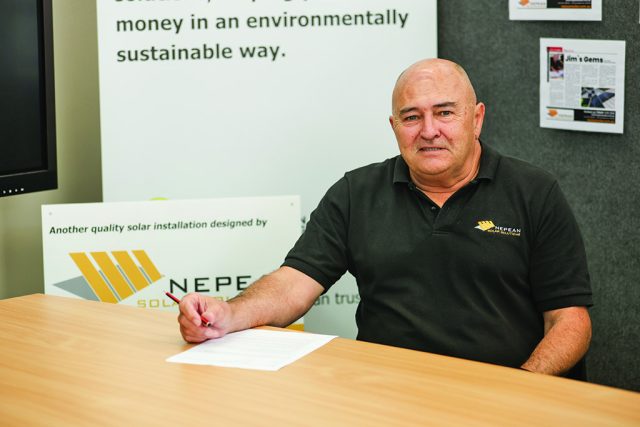The average cost of a monthly electricity bill in Penrith is $152, with the average yearly cost sitting at $1,827.
There’s no doubt that Penrith and Australia alike are suffering from a cost-of-living crisis where everyday necessities, like electricity, are rising faster than the consumer can afford.
Right now, roughly 30 per cent of Penrith’s electricity usage is being run by solar.
Solar panels work by converting sunlight into electricity through the photovoltaic effect which can be used to run a home.
Nepean Solar Solutions Owner Jim Hill explained that by using solar panels to fuel a home it can significantly reduce the pinch when it comes the cost of energy.
“The cost-of-living crisis is exacerbated by the increasing cost of energy, and it is one of those things you are paying for after you have used it,” Hill explained.
“It’s like going to the bowser and filling up with a blindfold on and not knowing how much the fuel is going to cost or how much you’ve used.
“It’s the same with [electricity], it’s one of those things you get a bill for your electricity three months after you’ve used it and you have no idea what you’ve done, it’s automatically deducted from your account.
“Where solar at least takes whatever you don’t use your generation for as the only part that is exposed to the market.
“If you can cover 80 or 70 per cent of your own usage, you are only going to be exposed to that 20 or 30 percent with the increasing cost.”
Solar is considered better for the environment as opposed to traditional fossil fuel-based energy sources, but it needs a widespread application to successfully work in a place like Penrith.
This would mean the roofs of houses, businesses and factories across the suburbs of Penrith would all need to be covered in solar panels to reduce the environmental impact of widespread energy consumption.
While installing solar is becoming a more popular choice for consumers, not everyone has the option like renters and businesses with shared roof spaces.
Hill believes for the time being different forms of energy working in tandem is the way to go until a completely renewable system can be reliably implemented.
“Solar does have its limitations,” Hill said.
“I personally think we should be exploring all ways of generating electricity whether that’s continuing coal for some time until we can come into a more renewable energy sector such as solar, gas and hydro and if nuclear works out to be part of that mix we need to start looking at that as well. We need to be looking at every way of producing electricity to make it cheaper for us to operate.”

Emily Chate
Emily Chate joined The Western Weekender in 2024, and covers local news - primarily courts and politics. A graduate of the University of Wollongong, Emily has contributed to The Daily Telegraph and worked as a freelance journalist.

